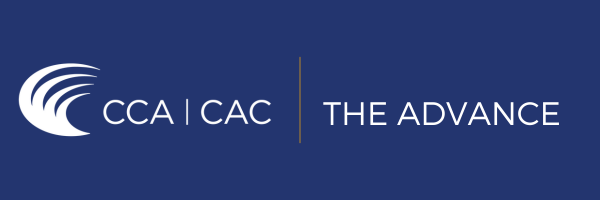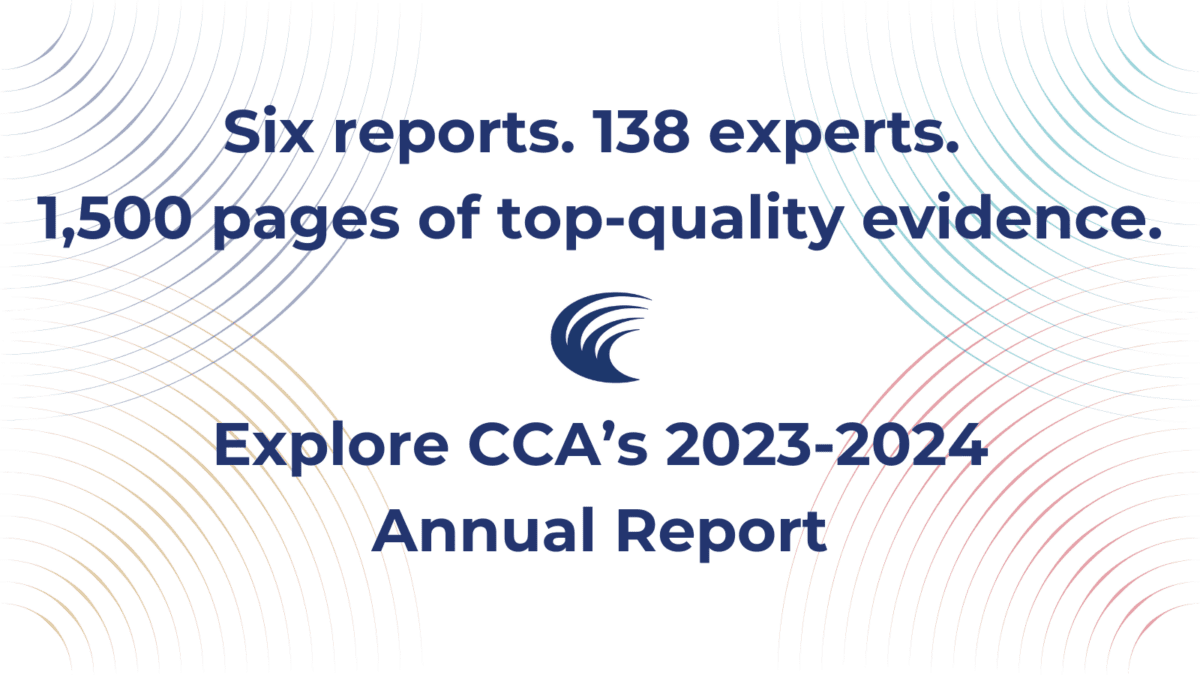
Welcome to The Advance, the newsletter of the CCA. Want to help us promote evidence-informed policy in the public interest? Feel free to forward this newsletter to a friend or colleague. If you haven’t subscribed yet, you can sign up here. Le français suit.
IN THIS EDITION:
- The CCA Summer Reading List
- Introducing CCA’s 2023-2024 Annual Report
- Readings on quantum technology’s appetite for energy, the complex relationship between sea ice and shipping routes, and more
- The future of pest management in Canada

The CCA Summer Reading List
The CCA office bookshelves are generously full of stories that shape our understanding of some of Canada’s most complex topics, from nature-based climate solutions to disaster resilience to strengthening Canada’s approaches to innovation. Below, we’ve highlighted a selection, written by members of our expert panels, to round out your summer reading lists and help you dig deeper into those issues that shape science policy in Canada.
- A few years ago, a survey of 1,500 respondents found that half couldn’t name a single female scientist. In Her Space, Her Time, Shohini Ghose, a member of our Expert Panel on the Responsible Adoption of Quantum Technologies, offers an engaging corrective, raising the profiles of women scientists whose work reshaped our understanding of the universe and challenged institutional barriers. “Every equation in physics and astronomy reveals some wondrous aspect of nature,” Ghose writes. “None of those equations requires a person of a particular gender to solve them.”
- In The Return of History, Jennifer Welsh draws on modern geopolitics to complicate the story of Western liberalism. “Liberal democracy has overcome many crises in its relatively short history,” Welsh, a member of our Expert Panel on International Science, Technology, Innovation, and Knowledge Partnerships, writes. “But its capacity to do so has lulled both the rulers and the ruled in Western societies into a state of complacency.”
- Sites of Truth, Sites of Conscience is the latest report from Kimberly Murray, Independent Special Interlocutor for Missing Children and Unmarked Graves and Burial Sites associated with Indian Residential Schools. In it, Murray, chair of our Expert Panel on Policing in Indigenous Communities, writes that the report is not intended to repeat the findings of Canada’s Truth and Reconciliation Commission, but to provide extensive historical evidence of colonial violence. “Exposing these records, as painful as it is to read them, is integral to upholding the right of Survivors, Indigenous families, and communities to know the truth,” Murray writes.
- What began, in Evan Fraser’s words, as a “silly exercise” at the start of the COVID-19 pandemic quickly turned serious. Fraser and Lenore Newman, members of our Expert Panel on Atypical Food Production Technologies for Canadian Food Security, pursued the titular thought-experiment of their book, Dinner on Mars, and found that it brought them rapidly back to agricultural challenges on Earth, driven by conflict, climate change, and more. “We realized solving these problems for an environment where you have no cushion–where there is no natural world, per se, to give you a hand–you actually start to solve these problems on Earth as well,” Newman, the panel’s chair, told the CBC.
- “We live in the health science era,” writes Timothy Caulfield early in the pages of The Cure for Everything. And yet, he notes, “at a time when scientific information has never been more important, it is being subjected to an unprecedented number of perverting influences.” Caulfield, a member of our Expert Panel on Health and Science Misinformation, offers a roadmap for the health-information landscape, and drives a number of curious routes himself.
- Jean-François Cliche and Marie‐Ève Carignan, who served alongside Caulfield on the misinformation panel, also share a concern for navigating dubious information. In Fake News, Cliche, a science journalist for Le Soleil, provides guidance for interrogating rumours and falsehoods whose sensational claims make them appealing. Carignan’s My Brother is a Conspiracy Theorist, written with David Morin, combines media criticism with psychological and social expertise, and emphasizes the essential role that dialogue plays, in our families and in our societies.
- New technologies have a way of outpacing older regulations. Artificial intelligence is no different. “AI is poised to transform the economy, the nature of work, entire fields of human endeavour…and the nature of government and commercial decision-making,” according to Florian Martin-Bariteau and Teresa Scassa, authors of Artificial Intelligence and the Law in Canada. “Many of these transformations are already underway, with the technology advancing more quickly than we seem equipped to regulate it.” In this volume, Martin-Bariteau, a member of our Expert Panel on Public Safety in the Digital Age, and Scassa, chair of our Expert Panel on Artificial Intelligence for Science and Engineering, gather a range of scholars to consider AI’s interactions with existing law, and how they might evolve together.
- Microbes, once seen exclusively as threats, support immune-system development, digestion, vitamin production, and more. In Let Them Eat Dirt, B. Brett Finlay, chair of our Expert Panel on the Potential Socioeconomic Impacts of Antimicrobial Resistance in Canada, details the ways in which microbes contribute to the health of young people. “Even as scientists in the field, we were stunned to discover some of the profound roles these microscopic bugs have in normal childhood development,” write Finlay and his co-author, Marie-Claire Arrieta. “No doubt many of these findings, and many more to come, will have a major impact on how we think about raising our children.”

Readings
- A new study has found that melting sea ice has enabled thicker, older ice to flow further south, shortening the shipping season and complicating food supply and costs in Canadian Arctic communities. “We’re still dealing with this challenge of resupply in the communities … and need to look at viable technologies to reduce food costs because there’s a major food security issue,” Jackie Dawson, a study co-author and member of CCA’s Scientific Advisory Committee, told the CBC. (Dawson served on CCA’s Expert Panel on the Social and Economic Value of Marine Shipping to Canada.)
- Innovation, Science and Economic Development Canada recently announced that it was “on track” to connect 98% of people in Canada to high-speed internet by 2026. In Waiting to Connect, the CCA detailed additional principles for equitable connectivity, including future-proof technologies and needs-based approaches.
- The Canadian Science Policy Centre has announced a series of curated conversations on a national innovation strategy, with attention to a variety of sectors, including clean technology, health and biosciences, advanced manufacturing, and more.
- On October 23, Acfas begins its fall conference, a collaboration with the Fonds de recherche du Québec and the Université de Sherbrooke. Acfas has also announced pre-registration for its fourth annual Vulgarisathon, to support science popularization efforts.
- The Canadian School of Public Service recently released a series of hour-long online courses on the use of scientific evidence for policy decisions. “Weighing Evidence for Policy Decisions” touches on the impacts of bias, the evaluation of scientific claims, and “the implications of changes to evidence over time.”
- The University of Saskatchewan has appointed Dr. Kate Congreves the Jarislowsky and BMO Chair in Regenerative Agriculture. Dr. Congreves served on the CCA’s Expert Panel on Plant Health Risks in Canada.
- In an op-ed for the Globe and Mail, Christian Weedbrook, founder of Xanadu Quantum Technologies, argues that quantum tech may help address rising energy consumption by data centres. Much of the increase in consumption, Weedbrook writes, is attributable to the use of artificial intelligence technologies; quantum, however, “enables exponential improvements in efficiency.” Weedbrook draws on the CCA’s Quantum Potential report.
